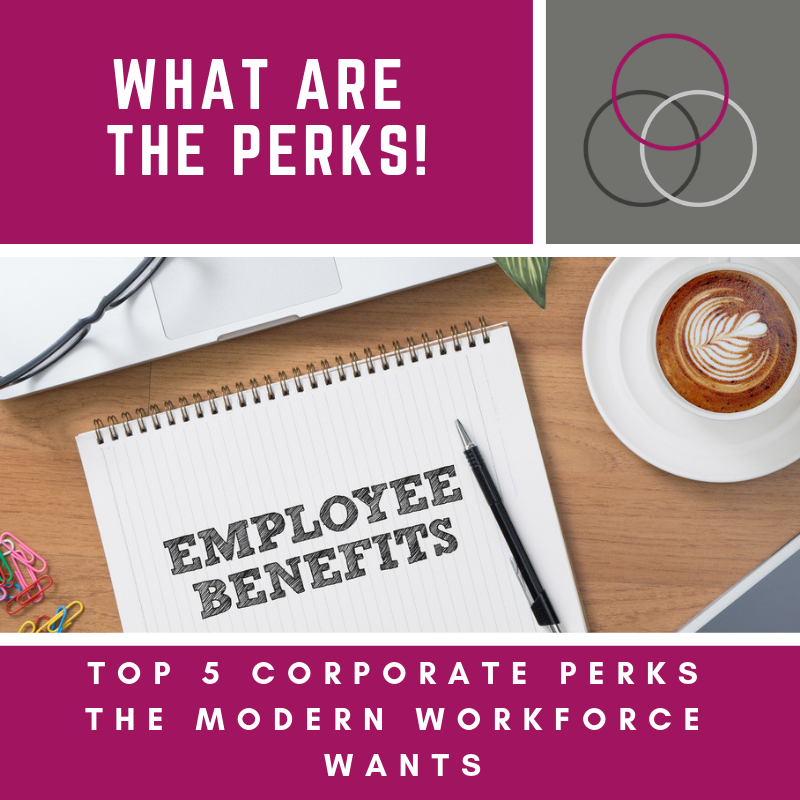Company Benefits: which ones matter to you?
20 October 2019

What we look for when it comes to company benefits has changed dramatically over the years. Benefits that once served as a competitive advantage for attracting talent are now common practice. Workers are expecting more – but it’s not just ping pong tables and a beer on Friday's that people are looking for.
Corporate perks by brands such as Google and Facebook have been changing how we view workplace dynamics. However, open dog policies and free-flowing snacks are not the main reason someone chooses to stay with a company. The corporate perks highly sought after by today’s workforce all deal with each employee as an individual. They want to feel like their hobbies are accepted, their values are integrated, and their goals supported within the company they work for. They expect employers to care about and invest in their well-being – which accounts for physical and mental health – to enable them to be the best they can be in their roles.
Here are just some of the most desired company perks in the modern working world:
1. Perks that relieve stress
95% of millennials are becoming more focused on managing or minimizing stress. From household chores to raising children, stress is a real problem for today’s worker. That’s why a number of forward-thinking companies have implemented corporate perks to help relieve some of that pressure. This is sometimes in the form of childcare centre's, haircuts, car washes and even a mobile spa. Laundry services, time to run errands and flexibility are all huge stress relievers.
Working from home and using flexible hours save employees both time and money - this is shown to be a huge stress reliever. Another example of stress relieving perks is companies who pay and invest in their employees chosen hobbies. Engaging in activities that are loved by employees shows that a company cares about that person's well-being and happiness.
2. Perks that offer experiences over things
Most of us care more about experiences than things!
Today’s workforce seeks jobs that are not just the typical 9 to 5. They want their roles to have meaning, to give them purpose and enable them to make a difference in the world. And that’s where experiential work-supported events come into play. Nearly half of millennials say they would take a 15% pay cut in a job where they could have social or environmental impact. This level of passion drives optimal creativity and innovation. Google has proven this to be true through their passion projects – where 20% of an employee’s time is spent on projects they care about!
3. Perks that prioritize learning
A lifelong learner should be every company’s dream employee. These employees are highly resourceful, autonomous, and productive problem solvers. They continually strive to grow and expand their skills and knowledge repertoire. So how do you attract, retain, foster and support lifelong learners in your organization? By helping them learn, of course.
People are looking for companies who are willing to invest in their future. For example, mentorship programs. Each program varies in how it partners workers with others in the companies from peers to seasoned managers.
Some companies support the notion that learning could and should also occur outside the workplace, particularly through meaningful experiences. Sabbatical programs that employees can take advantage of for personal or professional growth, while getting paid up to 40% of your salary sound good?
Helping people learn goes a long way when it comes to boosting performance and productivity. The takeaways employees gather from these experiences can be applied to their work, whether directly or indirectly.
4. Perks that align with company values
How you treat your employees speaks volumes to your company values. To this point, the type of corporate perks you employ will determine the type of talent you attract. To understand how your brand is being perceived by both candidates and employees, it’s important to reflect on how your perks align with company values.
Perks aren’t just about fun and games. Be purposeful about which perks you choose and mindful of what it says about that company.
5. Perks that promote healthy living
Employees perform their best when the basic needs of their lives are met. Health is at the core of those needs.
Comprehensive wellness programs that invest in employees’ physical, mental and social health have rendered profound results.
There are also indirect benefits from wellness programs- company wellness programs help to foster social connections, inclusion and trust between employees. There is a long list of companies who have made the business-savvy decision to care for their employees’ well-being.
So whilst you're searching for your next career step, think about the employee benefits that are most important to you and find the best match!